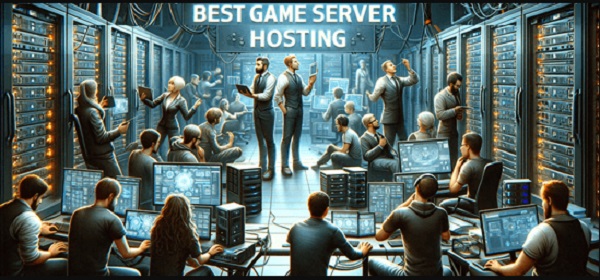Choosing the right game server hosting is crucial for delivering the best experience to your players. An inadequate server infrastructure can lead to poor gaming experiences, causing players to leave. To maintain optimal game performance, it is vital to find the right game server hosting that fits your unique needs. This ensures your players enjoy a satisfying experience that encourages them to return.
Types of gaming
There are three primary categories of gaming: single-player, synchronous multi-player, and asynchronous multi-player. Single-player games generally require fewer resources from your server and can be deeply engaging, featuring detailed graphics and expansive “worlds” (such as Red Dead Redemption or Minecraft). These games do not need the low latency connections that multi-player games necessitate, although there might be sporadic in-game purchases or leaderboard updates sent to the server.
Asynchronous multi-player games demand more from the game server infrastructure; these include turn-based games like Words With Friends, where players interact without real-time engagement. While the actions are not as time-critical as in fast-paced action games, the server must still process actions from one player and communicate them to another.
Synchronous multi-player games challenge your game hosting servers significantly; when multiple players engage in real-time action (like in Fortnite or CS:GO), robust servers are required to maintain low latency network connections for swift gameplay.
The nature of the game being developed will dictate the type of game server infrastructure that is most appropriate; if peer-to-peer networking is feasible, then dedicated hosting may not be required, as players can connect directly without additional support from a hosting service. However, for games such as Minecraft or CS:GO, a dedicated game server will supply all the necessary computing power to ensure efficient gameplay and an excellent player experience.
Player location
Understanding where your players are situated is key to selecting the optimal game server hosting solution. Speed is critical in gaming, as game servers are applications sensitive to latency. Players enjoy the best experience when latency remains below 60-100ms during interaction. Latency indicates the time taken for data to flow from the game hosting server to the players; if players report “lag,” it suggests their connection experiences high latency resulting from the server’s setup, adversely affecting their experience.
By positioning game server infrastructure nearer to your players, you can diminish latency; even with fiber optic cables transmitting data at the speed of light, each additional mile slightly increases latency. To ensure a favorable experience for all participants, players should be located as close as possible to the game server hosts that are running their games. If you cater to a worldwide player base, you might need a gaming server host with a global network of data centers.
Hardware requirements
What constitutes the best game server infrastructure for ensuring a seamless and efficient gaming experience for players? Cloud server providers typically offer hardware with high density powered by slower multi-core CPUs. While these machines serve general business computing tasks well, they might lack the necessary clock speeds to satisfy the demands of high-performance gaming, making them potentially unsuitable as a game server hosting solution.
To maximize value from your game server hosting package and configuration, consider how you can effectively utilize the multi-core CPU. Ideally, you should be capable of running several instances of the game server application on a single machine, but it’s crucial to allocate sufficient RAM for each core. This emphasizes the importance of selecting a dependable gaming server host.
A suitable provider will assist you in establishing various game hosting options so that you can test and identify an optimal setup for your game. If a provider is reluctant to support this vital aspect of specification, they may not be the right partner for you.
Engaging in online gaming with friends is the most enjoyable aspect of gaming, and it’s well-known that this requires a lot from the server’s performance. Whether you’re new to the digital realm or a veteran player, the quality and type of your server can significantly affect your gaming experience. Encountering unstable and laggy servers can disrupt the game flow for you and your friends, which is definitely not enjoyable! When selecting game server hosting, several important factors should be considered to guarantee an excellent gaming experience. This article aims to assist you in finding the ideal server hosting solution.
1. Game selection and compatibility
The initial step in choosing a game server hosting is to pinpoint your desired genre. Knowing your preferred gaming style will enable you to find a suitable server hosting option. Focus on your favorite genre to discover the games that match your interests. Ascertain the maximum number of players your server should accommodate and the specific requirements of the game. Furthermore, a dependable host should offer a broad array of game servers to choose from. Support for a diverse selection of games, including widely played Palworld server hosting, can indicate a trustworthy and skilled provider.
2. Performance and uptime
Performance and uptime refer to the average duration that servers are operational and their capacity to process data and run a game swiftly. Online games often feature intense visuals that necessitate servers capable of providing an immersive experience and supporting high frame rates. When picking a hosting provider, consider one that presents strong networks, promises at least 99.9% uptime, and offers a low-latency connection along with dedicated resources such as CPU and RAM to ensure smooth, lag-free gameplay. A reputable hosting provider should commit to minimal downtime and high-quality hardware that surpasses your needs.
3. Server location
The location of the server is critical in influencing the quality of your games. The nearer the server is to the player, the better the performance of the game, and the opposite is also true. The most effective hosting companies will maintain multiple data centers across the globe to decrease latency and serve a wide-ranging player base.
4. Security
In the realm of digital gaming, cyber threats and malicious attacks are prevalent. A reliable hosting provider offers strong security features and backups to guarantee that your gaming experience remains seamless. Select a host that has trustworthy security measures to safeguard against unauthorized access, DDoS attacks, and data breaches.
5. Customer support
Regardless of your gaming experience, there will come a time when assistance is needed. Whether you encounter a technical issue, need help troubleshooting, are considering upgrades, or want to set up your servers, your host should provide quick support to assist you in resolving the situation.
Here are factors to keep in mind:
• 24/7 responsive customer support.
• A knowledgeable customer service team familiar with the games you play.
• Positive reviews from other clients commending their responsiveness and helpfulness.
6. Scalability
As your community expands and more friends join your servers, you will require additional reliable resources. Make sure your chosen plan can adapt to this growth. The best VPS host should provide straightforward scalability options to facilitate upgrading your servers without any disruptions.
In the vast landscape of online gaming, selecting a game server host is a crucial decision that profoundly impacts the gaming experience for players. Whether you’re operating a multiplayer first-person shooter, a large online role-playing game, or a strategy game, choosing the right game server host is vital for smooth gameplay, minimal latency, and a dependable gaming environment. This blog seeks to guide gamers and game developers through the process of locating the appropriate game server host by evaluating essential factors such as technical requirements, server location, reliability, scalability, customer support, security features, and user-friendly control panels.
Understanding Your Game Server Requirements
Comprehending your game server requirements is a crucial step in creating and sustaining a successful gaming community, beginning with a thorough analysis of your game’s specific demands. Whether you are navigating the complex world of a massive multiplayer online game (MMO) or providing an engaging experience for a specialized audience, recognizing the technical specifications and anticipated player capacity is vital. This detailed evaluation sets the foundation for a smooth gaming experience and helps identify the best hosting solution. Choosing dedicated game server hosting ensures exclusive resources for your game, guaranteeing consistent performance and avoiding potential issues associated with shared hosting environments. This tailored strategy precisely addresses the needs of your game, providing the reliability and scalability you require.
Budget considerations are crucial when assessing your game server requirements. The financial aspect defines the boundaries for exploring dedicated game server hosting options that offer a balance between performance and cost efficiency. Recognizing your budget limitations enables you to make educated choices, ensuring that the selected hosting solution aligns with your financial parameters while providing the necessary technical specifications for a smooth gaming experience.
Incorporating dedicated game server hosting into your planning allows you to emphasize both performance and reliability, ultimately setting your game up for success in the competitive world of online gaming.
Server location and latency are essential factors in online gaming, where immediate responsiveness can be the difference between an enjoyable experience and frustrating lag. The geographical positioning of game servers significantly affects the latency felt by players. Choosing a server location that is strategically matched with your target audience reduces latency and promotes smooth gameplay. In this regard, the term “game server location” becomes paramount. Evaluating the worldwide distribution of your player base helps identify optimal server locations that lessen the physical distance between players and servers, which in turn lowers latency and improves the overall gaming experience. This method not only meets the technical demands of your game but also shows a dedication to providing players with a responsive and immersive gaming atmosphere.
Minimizing latency is particularly critical in competitive online gaming, where quick decisions can determine the outcome of a match. Game developers and server administrators need to collaborate to identify server locations that effectively serve the gaming community. By focusing on proximity and thoughtfully selecting server locations, game developers can foster an inclusive and responsive online environment that caters to a diverse global player base. In the competitive realm of online gaming, addressing latency through strategic server location is a fundamental factor in delivering an engaging and enjoyable gaming experience.
Reliability and uptime are key considerations when choosing a game server host, as they directly affect the seamless continuity of gaming experiences. Players anticipate uninterrupted access to game servers, and any downtime can lead to frustration and dissatisfaction. In the gaming industry, where user engagement is critical, maintaining a high level of server uptime is vital. In this context, “game server reliability” becomes a focal point. Selecting a host with a strong reputation for reliability includes evaluating historical uptime percentages, understanding the redundancy measures in place, and investigating the provider’s overall performance history. A dependable game server host minimizes the chances of disruptions, offering players consistent access to the gaming platform and improving the overall reputation of the game.
To protect against unforeseen issues, redundancy and backup systems are essential components of a reliable game server hosting solution. Redundancy guarantees that if one server experiences a problem, another can seamlessly take its place, reducing downtime. Strong backup systems further enhance the reliability of a game server host by providing data recovery options in the event of unexpected incidents. Game developers and administrators should prioritize hosts that focus on reliability and uptime, creating an environment where players can continually engage with the game and have a stable and dependable gaming experience.
Scalability and upgrades are vital considerations for game server hosting, particularly in the rapidly changing field of online gaming, where player populations can fluctuate quickly. Scalability refers to the capability of a game server to support growth, making it an essential factor for developers aiming to expand their player base. The term “game server scalability” holds significant importance in this context. Choosing a host that allows for easy scaling of server resources ensures that the game can adjust efficiently to rising demands without compromising performance. Scalability is not solely about managing a growing player base but also about enhancing overall performance and responsiveness as the game develops.
Besides scalability, the options for upgrades and expansions are crucial for future-proofing the game. The gaming industry is constantly changing, with technological advancements and player expectations continually evolving. Game developers require a hosting solution that enables them to introduce new features, improve performance, and remain competitive. The ability to upgrade server resources or extend to more powerful configurations guarantees that the game can advance alongside industry trends and player preferences. By emphasizing scalability and upgrades, game developers ensure that their hosting solutions can adapt to future demands.
Support and customer service are essential components of game server hosting, playing a vital role in ensuring a positive experience for both players and developers. The responsiveness and knowledge of a hosting provider’s support team are crucial, particularly in the fast-paced online gaming environment where quick resolutions are required. The focus keyword in this scenario is “game server support.” Hosting providers that deliver reliable and immediate support through various channels like live chat, email, or ticketing systems significantly enhance the satisfaction of both game developers and players. Having support available 24/7 is important for addressing urgent issues that may arise during gameplay.
Effective communication and well-informed support staff become indispensable when technical difficulties occur. Hosting providers that emphasize customer service help create a favorable gaming atmosphere, cultivating trust between developers and players. Game developers should consider hosts that not only provide strong technical infrastructure, but also show dedication to supporting their clients with prompt and knowledgeable customer service. By prioritizing support and customer service during the selection process, game developers can make sure that potential problems are swiftly handled, improving the overall stability and dependability of their gaming platform.
In the field of game server hosting, security features are of utmost importance due to the sensitive nature of player data and the constant threat posed by malicious attacks. Strong security measures are crucial for safeguarding both the game and the personal information of players. The keyword “game server security” underlines the need for hosting providers to adopt comprehensive security protocols. Effective DDoS protection is a significant part of game server security. Hosting providers should offer robust DDoS protection measures to defend the game server against potential interruptions from harmful traffic. This guarantees that the gaming platform remains continuously available and maintains the integrity of the player experience.
Beyond DDoS protection, game developers and administrators should evaluate the backup and recovery solutions provided by hosting companies. A secure hosting environment encompasses regular data backups and effective recovery processes, protecting player progress and game data in case of unforeseen incidents. By emphasizing security features, game developers can shield their creations from potential threats and foster trust among players, nurturing a safe and reliable gaming community. Security is an essential component of game server hosting, and providers that prioritize strong security features greatly contribute to the enduring success and stability of online games.
An intuitive control panel is fundamental to effective game server hosting, as it enables game developers and administrators to manage server settings with ease. The keyword “game server control panel” highlights this element’s importance within the overall user experience. A simple and accessible control panel streamlines the often complicated process of adjusting and overseeing server settings, making it user-friendly for both experienced developers and those with limited technical skills. Game developers should search for hosting providers that deliver a user-friendly control panel, facilitating efficient server management and minimizing the learning curve for administrators.
Offering a demo or trial option for the control panel is an added advantage, allowing developers to explore its features and customization possibilities before settling on a hosting service. A well-constructed control panel not only simplifies administrative tasks but also improves the overall efficiency of managing a game server. By prioritizing an easy-to-use control panel, game developers can dedicate more attention to the creative aspects of game development and less to the complexities of server management, resulting in a smoother and more enjoyable experience for both administrators and players.
Community input and user reviews are instrumental in choosing a game server host, providing invaluable insights and firsthand experiences from fellow developers and players. The keyword “game server reviews” emphasizes the importance of leveraging the collective opinions of the gaming community. Online forums, social media channels, and dedicated gaming communities serve as rich information sources where developers can find recommendations, cautions, and personal experiences with various hosting providers. Gaining knowledge from the successes and challenges faced by peers helps game developers make informed choices based on the actual performance and reputation of hosting services. User reviews and testimonials offer a glimpse into the experiences of others.



